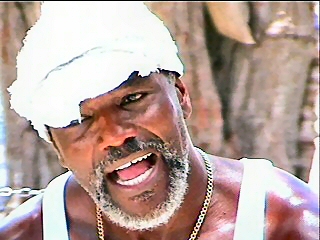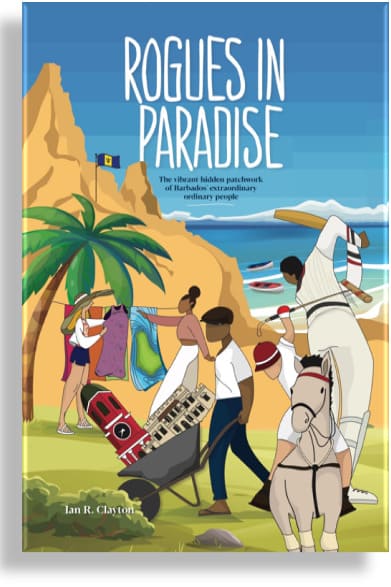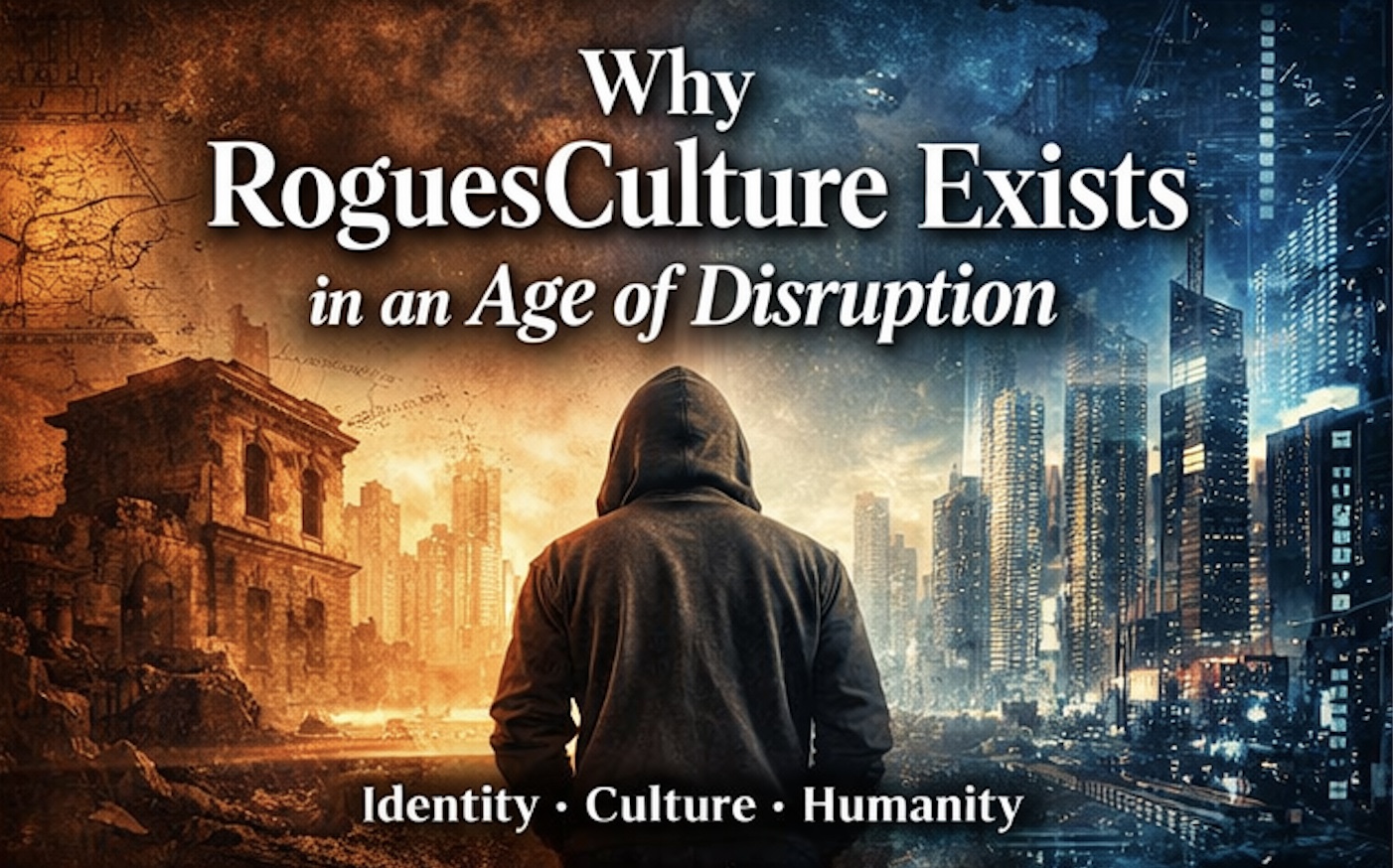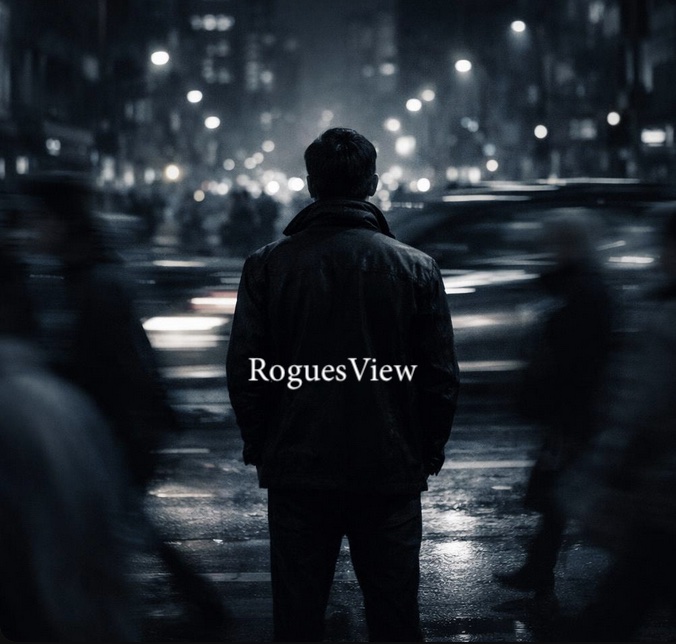This piece is part of the RoguesCulture podcast series, where we explore the scars and legacies of empire—and how identity can both remember and transcend them.
Identity is both memory and imagination—the stories we keep, and the futures we choose. In the Caribbean, and in Barbados in particular, identity has been shaped in the crucible of slavery, survival, and colonial exploitation. These histories cannot be erased, and nor should they be. They demand remembrance, acknowledgement, and in many voices today, reparation. Yet the question remains: how do we remember without being consumed? The resilience of the Caribbean people in the face of such adversity is truly inspiring. But slavery and colonialism left wounds so deep they shaped every aspect of society — from economy to religion, from family life to cultural expression. Remembering is vital, but when the worst abuses are continually relived, the pain can harden into anger, and anger into hate—a path that risks leading to deeper conflict and division.
The Colonial Context
For centuries, Barbados was called “Little England.” Generations of Bajans considered themselves proudly British, upholding traditions, institutions, and loyalties that mirrored the colonial power. However, that illusion began to crack as global movements for justice grew louder. The call for reparations placed sharp focus on the scars of slavery and exploitation.
The debate exposed a paradox: how can a people feel British while bearing the trauma of British brutality? For many, the realisation was painful but necessary. Seeking to define the Bajan identity often means confronting the past. Looking back is not the problem; the danger lies in digging up the worst atrocities and reliving the abuse, for that cycle of pain can harden into anger, and anger into hate — a path that risks leading to deeper conflict and division..
Once celebrated as “Little England,” many Bajans proudly saw themselves as British. But today the island stands at a crossroads: the call for reparations has thrown sharp focus on historical abuse.
Looking back too long can fuel anger, and anger can harden into hate — a path that risks leading to deeper conflict and division.
Beyond Anger: The Power of Choice
As my friend Errol Griffith reminded me, real change lies not in anger but in choice. Memory without direction can trap us in bitterness. But remembrance, paired with resilience, can become a foundation for growth.
The Caribbean spirit has always been one of adaptation, humour, and survival. Identity, then, is not just what history imposed but what people choose to create from it. By acknowledging the past while refusing to be defined by its cruelties, Bajans continue to shape an identity that is both grounded and free.
This tension is woven through the characters in Rogues in Paradise. Yardfowl rages against the colonial past. His anger is raw, urgent, and justified. He represents those who demand reckoning with the abuses of empire. Yet his voice, though powerful, is not the only one.
Woolly, by contrast, embraces his mixed heritage. He acknowledges both European and African roots, finding wholeness rather than division.
David, too, offers a lesson in balance: “I am comfortable in my skin,” he says, without bitterness. These voices remind us that identity can be forged through pride as much as through pain.
The rogue spirit lies precisely here — in refusing to let history dictate the boundaries of self. Rogues remember, but they do not become prisoners of memory. They take the spoils of colonialism — its contradictions, its imposed divisions, even its pain, and refashion them into resilience, humour, creativity, and cultural pride.
The Global Lesson
This is not only a Caribbean story. Across the world, communities grappling with colonial legacies face the same dilemma. To forget is betrayal. To dwell only on atrocity is to risk being consumed by it. True identity requires both memory and transformation — the courage to face what was, and the wisdom to build what can be. This balance is a key aspect of identity formation that we should all reflect on.
It is a balance many societies struggle to strike. Some demand reparations, others demand silence. Identity can flourish in both scenarios, remembering without being defined solely by suffering, creating culture from contradiction, and building freedom from the spoils of oppression.
Towards Freedom
The rogues of Barbados embody this balance. They remind us that identity is not about denying pain, but about transcending it. To be truly free is not to forget the past, nor to be consumed by it, but to shape it into something new.
The spoils of identity in the face of colonialism are paradoxical. From brutality emerges resilience. From division emerges creativity. From past abuse emerges pride. This is the rogue’s lesson — and it is as relevant today as it was when the first voices of resistance rose from the cane fields of Barbados.
Rogue Identity Podcast
In the podcast version of this story, we go deeper into how remembrance can empower rather than divide. Listen in on RoguesCulture to hear it unfold.
Part 2, Identity in Motion – coming soon.
The Identity Podcast Series:
- The Spoils of Identity in the Face of Colonialism (Part 1).
- Identity in Motion (Part2) Specific regional and national examples
- The World: Identity Across Cultures(Part 3) for the broader framework.
- Africa: Origins & Echoes of Identity (Part 4) for the deep dive on roots and continuities
- Identity in Profession, Passion, and Belief
- Conclusion (Paart 6) Identity & Future
This series follows the RoguesCulture Manifesto, ending with Cultural Identity
The Book Rogues inspire this series.
Grab the free sample chapters and get invited to the launch of
Notes on Identity
Identity is not fixed. It is a multifaceted concept, shaped by psychological, social, and cultural forces. Psychologically, it grows from memory, values, and self-belief. Socially, it is formed through relationships, family, community, and culture. Culturally, it is rooted in traditions, histories, and symbols we inherit.
Identity also changes. It evolves in response to both internal factors, such as beliefs, self-efficacy, and personal growth, and external forces, including family, society, culture, media, or significant life events. Marriage, parenthood, migration, and historical upheavals can all reshape how people see themselves. In this sense, identity is a continuous, fluid transformation. That is why the Caribbean experience — marked by slavery, colonial rule, and resilience — has had such a profound effect on shaping the collective identity of Barbados and its people.
PODCAST Blogs & Resources
- RoguesCulture Manifesto Deep Dive: Identity AI & Humanity
- Washington Black Meets the Real Barbados
- Podcasts Shift to Video: Amazon Says Listen-Only is Broken
- RoguesCulture Rebel Soul Music Podcast – episode #2
- RoguesCulture-The Punk Rebellion
- RoguesCulture Music Rebels
- RogueCulture – Podcasts Rising!
- RogueCulture Asks What Is a Podcast Anymore
- Molten Memories: The Animated Podcast Experience
- Molten Memories- Rogues Culture Podcast 2
- RoguesCulture -The History Of Podcasting
- Podcast Marketing Strategies Added
- Rogues Hybrid Podcast Animated Video
- Overview Rogues Podcast 1 Script












